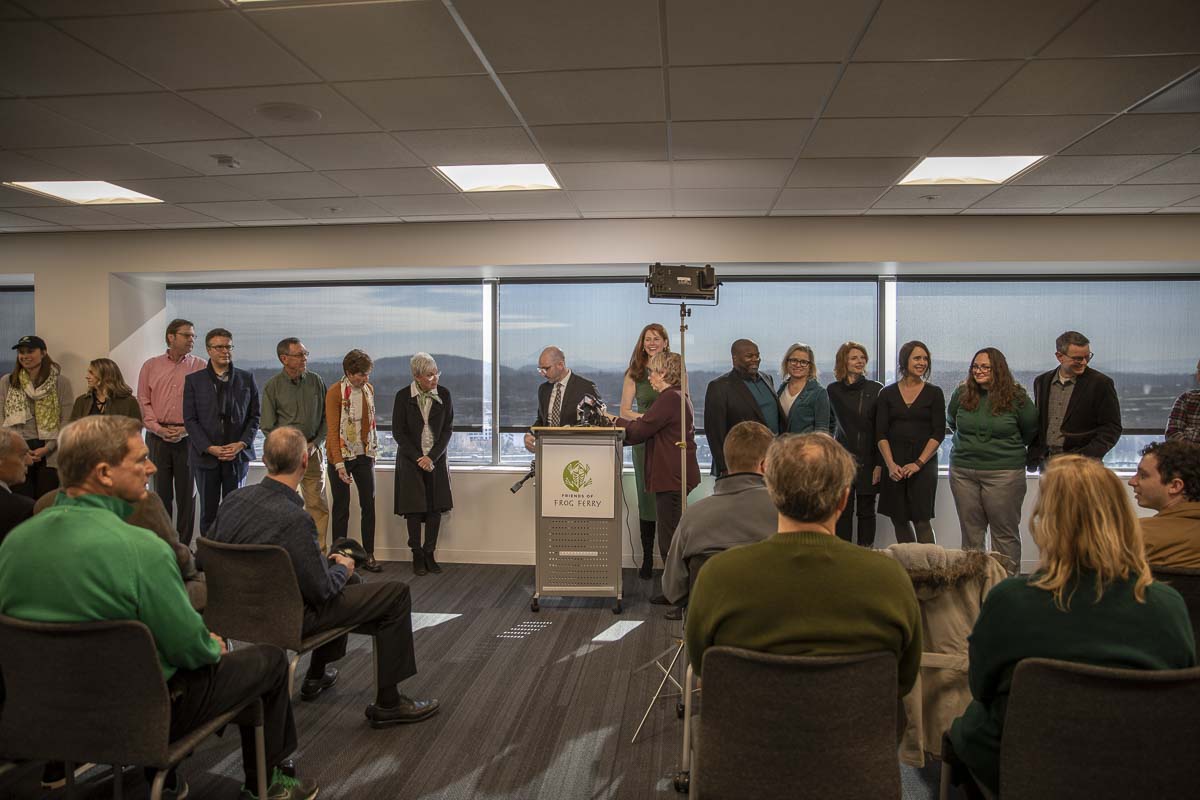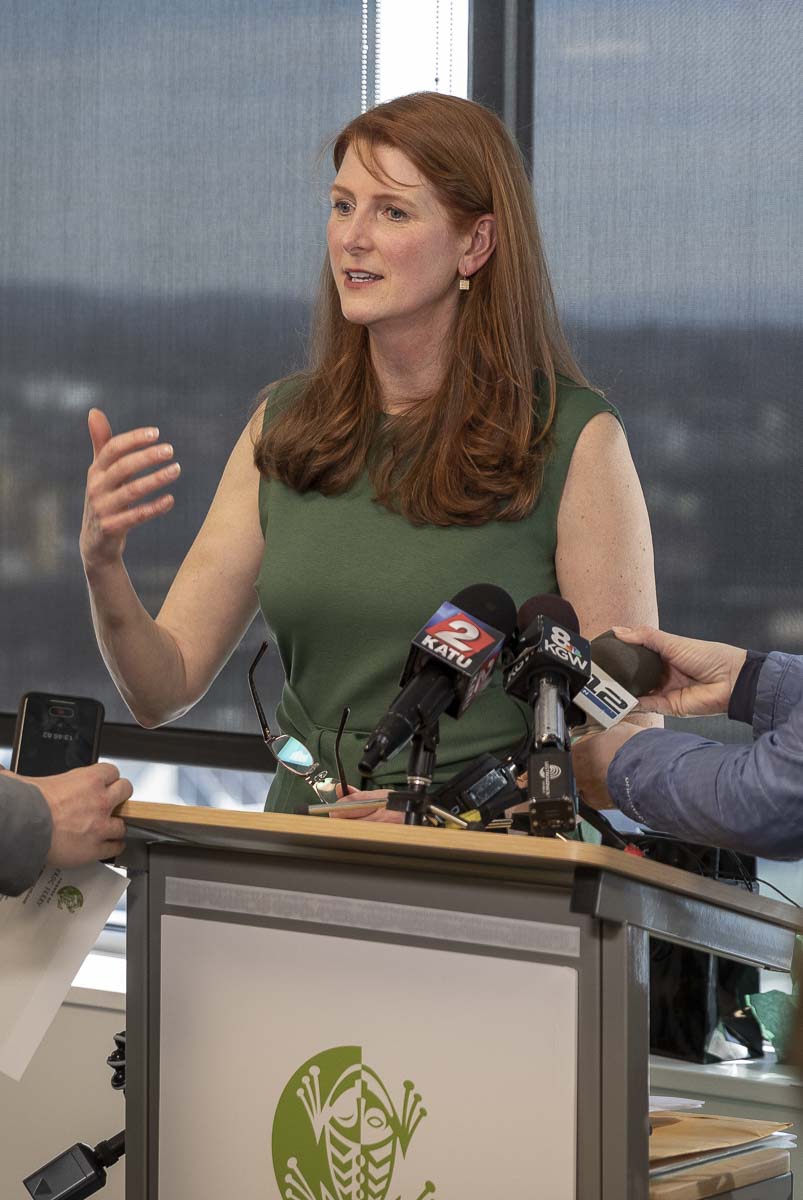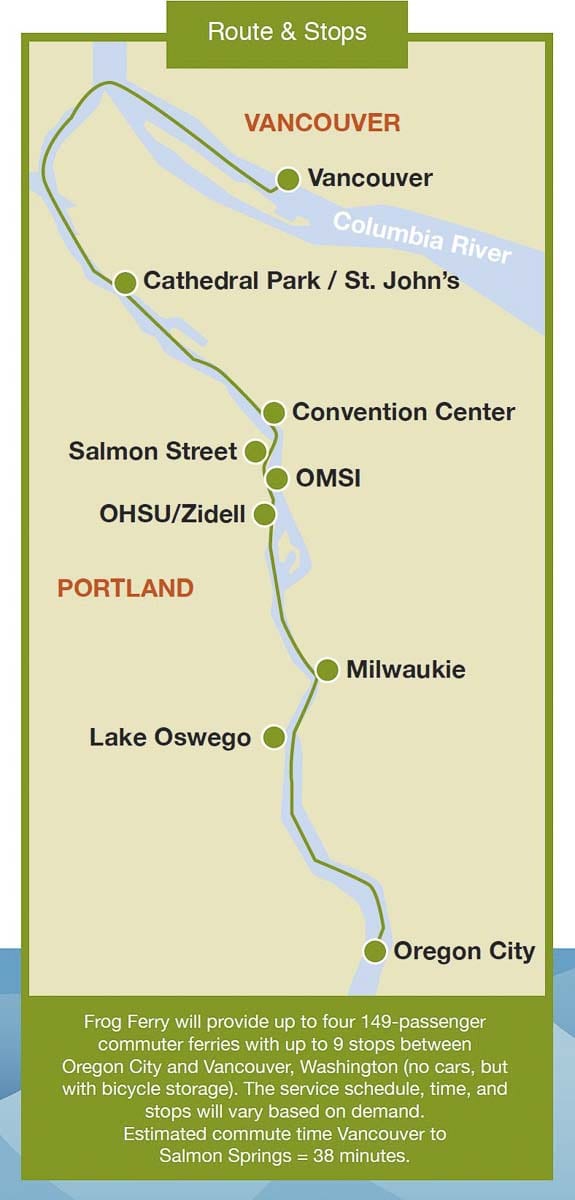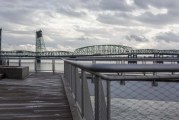Nonprofit group finishes two feasibility studies and prepares for two more
PORTLAND — The recently formed nonprofit Friends of Frog Ferry (FFF) held its second press conference this week, and delivered several new pieces of information regarding the process of bringing a passenger ferry service to Vancouver and Portland.

Since their last gathering in November of 2018, the organization has completed two of its four feasibility studies, secured partnerships with public and private entities and set a more specific timeline of goals.
“Our goal is to make our community aware that bringing a ferry service to the region is not only possible, but we’re getting closer to bringing it to a reality,” said Friends of Frog Ferry Founder Susan Bladholm. “Our local transit agencies have acknowledged that the river provides a viable mode of transportation, but they can’t take the lead on this. And they’ve asked us to do it. And so we are.”
Since 2018, FFF has accumulated over 1,000 stakeholders and released the findings of it’s first two feasibility studies: Best Practices and Demand Modeling. Within the first of these two studies, Bladholm and her board, along with ferry experts from Seattle, evaluated the possibility of having a ferry on the Columbia and Willamette rivers by looking at other ferry services domestic and international.

The experts found the waterways to be compatible with a ferry system. Now, FFF is basing the overall framework of their gameplan, in part, on that of Portland Streetcar, the organization which helped create the TriMet light rail system in Portland.
According to Bladholm, FFF will need to find a public agency to own the ferry fleet, who would then contract out for the operation of said fleet. The inclusion of the public agency opens the door for large amounts of federal funding through the Federal Transit Administration (FTA); which is allowed to provide up to 80 percent of capital infrastructure to ferries.
“Oregon is one of the few states, one of 10, that doesn’t regularly tap into federal passenger ferry funding,” Bladholm said.
In the second study, FFF found in conjunction with the Portland Bureau of Transportation (PBOT), TriMet and Metro, that significant enough demand exists for the creation of such a ferry service to be useful, according to Bladholm.
From here, FFF is now working with PBOT and Oregon Department of Transportation (ODOT) to develop a plan from the study, which will assess current assets and needs. ODOT is contributing $200,000 to the process and PBOT another $40,000 to what is known as FFF’s Operational Feasibility and Financing Plan.
“It will tell us what is needed, how much it’s going to cost, and then how are we going to pay for it once we have that finance plan completed, which we anticipate will be delivering back to all of you this summer,” Bladholm said. “If it shows an economically viable operation, I want to make that very clear, that that operational feasibility study and finance plan must show an economically viable operation, then we will share it with the public agencies and our private sector leaders to see if they will all support us.”

With regard to partnerships, Bladholm introduced James Paulson, the Worksystems board chair, and Charlene Zidell, the VP of strategic partnerships for Zidell Companies. Paulson is currently meeting with community members, specifically minorities, in Oregon and Washington to garner feedback on the proposed plans.
“Let’s bring these voices into our community benefit plan, so that we’re able then to use that as we start moving the design and development of the ferry system forward,” Paulsen said. “We go out to a number of neighborhood associations, business associations, and pretty much anyone else who will sit down and meet with us, to really share with them what we’ve got going on, and we really want to hear from them what they need, because in the end, this needs to be a community good for everyone.”
Zidell, who spoke at the 2018 conference as well, shared her heart as an early supporter of the program proposal and the process FFF is now engaged in.
“For so many years, I would stand on the bank of our property and I’d look across the river and see OMSI and I would think, ‘Wow, why doesn’t a ferry come and pick me up and just run me across the river,’ but instead I have to get in my car,” Zidell said. “The Frog Ferry is the answer to my dreams. We forgot that the river can be part of the transportation system. Here we are today at this very exciting point, where we kind of get to look at the second version of what our river looks like, and how it can play a very important role in the transportation ecosystem.”
In the realm of goals and timelines, FFF is seeking to implement up to four, 149-passenger ferries along a route of nine stops from Vancouver to Oregon City. Cathedral Park and St. John’s along with the Convention Center, Salmon Street, OMSI, OHSU, Milwaukie, and Lake Oswego could be among the stops.

By summer of this year, FFF hopes to have its financial plan completed, and by the fall expects to have a full Triple Bottom Line for the proposal. In 2021, the organization will take the finalized package to public agencies and based on the interest, will make a “go or no-go” decision. Following a green light, FFF expects to begin service in spring of 2023.
“Let’s be clear, public transit is expensive. Whether you’re riding max or a bus or the Portland streetcar, public transit is also vital to a healthy community,” Bladholm said. “We believe the ferry service costs will be relatively speaking, to other transit modes, affordable … For road and rail based transit, you have the cost of infrastructure and the maintenance on that infrastructure. We’re committed to being fully transparent and communicating all of the costs.”
Bladholm went on to say they do not expect Frog Ferry, if created, to cost more than existing public transit, such as TriMet or CTRAN buses.
The estimated figures for operation times and cost have also been calculated, with a trip against the current from downtown Portland to Vancouver’s waterfront being 38 minutes, and less the opposite direction with the current. It will cost an average of $1 million a month to maintain the proposed four vessels, with a startup capital construction cost of $50 million; with up to 80 percent of that from the FTA.
The expected passenger capacity to be moved in one year’s time is 2.4 million people, with each paying $5.50 for a daily ticket or $125 for a monthly pass.
The design of the ferries is still under consideration, but FFF is putting forward models that would be hybrids in nature; propelled by electric motors and biodiesel capable engines. This aligns with the organization’s goal of not only reducing traffic congestion, but carbon emissions as well, Bladholm said.
For more information on Friends of Frog Ferry, visit their website at frogferry.com.
Also read:
Area nonprofit works with Portland and Vancouver to create passenger ferry service





